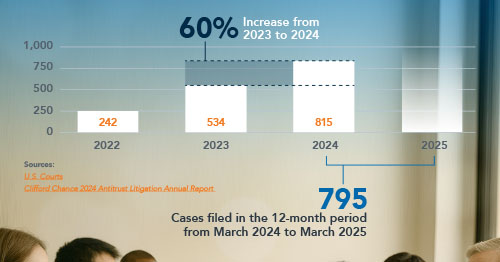
Impacts of HSR Premerger Notification Rule Changes
November 14, 2024
By:
Summary: The Federal Trade Commission finalized changes to the premerger notification form and rules that implement the Hart-Scott-Rodino (HSR) Act. We examine how these changes impact the time and expense of premerger notification filings.
The FTC recently finalized changes to the premerger notification form and rules. The form and rules implement the Hart-Scott-Rodino Act, which requires parties to acquisitions valued above a specific monetary threshold (currently $119.5 million) to notify regulators about the impending deal. The finalized changes go into effect 90 days after publication in the Federal Register.
As I noted in our 2024 Second Request trends report, the final version of the changes has been highly anticipated by antitrust attorneys and eDiscovery providers alike, due to the additional burden the proposed rules would have imposed on filing parties when the draft was released in 2023 by the FTC.

While the agency did appear to heed concerns voiced during the public comment period by modifying some of the more burdensome proposed changes, the finalized rules still contain significant new document production obligations that parties to M&A transactions and antitrust counsel must prepare for. The top four are:
Transaction-related (i.e., “Item 4 (c) and (d)”) documents prepared by or for a supervisory deal team lead.
- What’s required? Filers must now produce all transaction-related studies, surveys, analyses, and reports prepared by or for the “supervisory deal team lead."
- What’s a “supervisory deal team lead”? This new term is defined as an “individual who has primary responsibility for supervising the strategic assessment of the deal, and who would not otherwise qualify as a director or officer.”
- How is this obligation different than the current rules? Under the current rules, these documents only need to be produced if they were provided to an officer or director.
Any version of a transaction-related document (i.e., “Item 4 (c) and (d)”) shared with any member of the board of directors must be produced.
- What’s required? Any version of a transaction-related document that was shared with any member of the board of directors must be produced as final and responsive (i.e., cannot be considered a draft).
- How is this obligation different from the current rules? The current guidance was limited to considering versions of these documents final and responsive only when they were shared with the entire board.
Obligation to translate any responsive foreign language documentation into English before production.
- What’s required? Filers must now produce “verbatim English language translations” of any responsive foreign language documents. The rules do not specify a required method of translation but do state that “all verbatim translations must be accurate and complete.”
- How is this obligation different than the current rules? There is no obligation to translate foreign language documents into English under the current rules.
Plans and reports related to competitive overlap, if those documents were provided to the board of directors or CEO.
- What’s required? Filers must now produce any “regularly prepared plans and reports” that analyze “market shares, competition, competitors, or markets” related to any product or service that both parties sell or provide—if those documents were provided to the CEO or board of directors and were created or modified within one year of the date of filing.
- How is this obligation different from the current rules? There is no obligation under the current rules to produce this documentation.
How should antitrust counsel and organizations prepare?
Antitrust counsel and organizations anticipating M&A activity in 2025 should begin preparing to comply with the new requirements now.
- Build in additional time to prepare for premerger notification filings. The FTC estimates that the changes will increase the time it takes to prepare a filing by an average of 68 hours—but also notes that could increase to an additional 121 hours for filings related to transactions with overlaps.
- Verify document retention and collection policies and capabilities. Ensure that corporate document retention policies are updated, and systems are implemented appropriately so that newly required documentation is preserved and can be collected.
- Research translation services to understand costs and turnaround times as early as possible, if you expect to produce foreign language documents.
- Reach out to eDiscovery providers with antitrust experience. eDiscovery providers who routinely handle antitrust and Second Request matters are in the best position to help guide you through preservation, collection, review, and production of required documentation under the new rules. We can also quickly identify key documents that regulators will be interested in early on, so that you are set up for M&A success.
For a deeper look into the trends our experts have been seeing in Second Requests in 2024, check out our antitrust practice.



.jpg)




